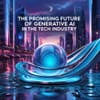Generative AI is poised to reshape the tech industry in remarkable ways, driving innovation and enhancing creativity across various sectors. As this technology continues to evolve, its potential applications are becoming increasingly diverse, paving the way for transformative changes in how we approach tasks and problem-solving.
One of the most exciting aspects of generative AI is its ability to create content—whether it’s text, images, music, or even code. This capability opens up new avenues for creativity, enabling developers, artists, and marketers to produce high-quality material efficiently. For instance, designers can use generative AI to generate unique visual concepts, while writers can brainstorm ideas and draft content more quickly.
In addition to content creation, generative AI is revolutionizing product design and development. By leveraging machine learning algorithms, companies can simulate various design scenarios, allowing them to iterate faster and create more innovative products. This not only enhances creativity but also reduces time to market, giving companies a competitive edge.
Moreover, generative AI can significantly improve customer experiences. Businesses are using this technology to personalize interactions and tailor recommendations based on user preferences. This level of customization fosters stronger customer relationships and can lead to increased loyalty and sales.
However, the rise of generative AI also raises important ethical considerations. As the technology becomes more integrated into everyday processes, issues such as content authenticity, copyright, and biases in AI-generated outputs must be addressed. It’s crucial for organizations to implement guidelines and practices that ensure responsible use of generative AI.
The future of generative AI in the tech industry is bright. As advancements continue, we can expect to see even more innovative applications that enhance productivity and creativity. Embracing this technology will not only revolutionize individual businesses but could also transform entire industries, leading us into a new era of technological advancement.


